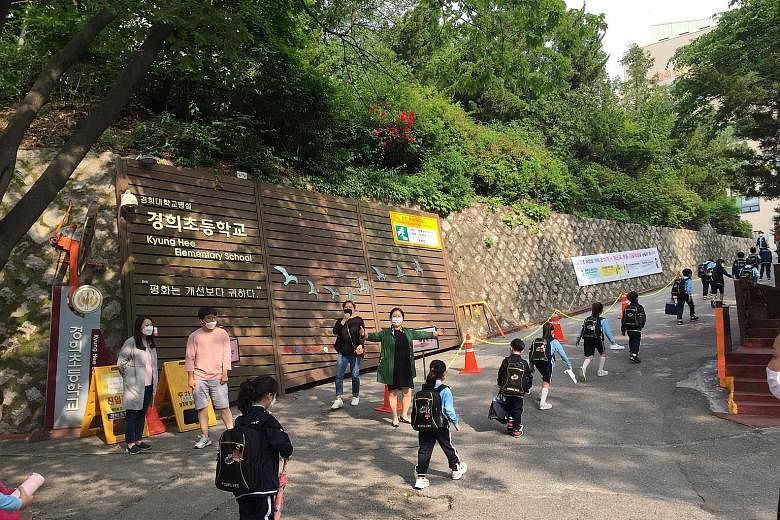South Korea has now confirmed three new Covid-19 cases in what is emerging as the country's first school infection cluster in the central city of Daejeon, sparking concerns over the effectiveness of preventive measures in schools.
The country reported 51 new cases yesterday, including 36 infections in the community. This brings the total tally to 12,850 while the death toll remains at 282.
The first case at Cheondong Elementary School in Daejeon was found on Monday when a Grade 5 boy tested positive together with his older brother, a middle school student.
Two other infections in the school were confirmed on Tuesday evening - a classmate of the first patient and a pupil who came into contact with him in the school gym.
So far, 159 people who came into contact with the first student patient have tested negative. Investigations are ongoing.
This is the first school cluster since South Korea resumed lessons at school premises in phases from May 20, starting with high school seniors.
Previously, clusters had been found in private academies where many students attend after-school lessons in cramped classrooms, but there was none in public schools.
To ease parental concerns, schools have implemented preventive measures such as compulsory mask wearing, frequent hand sanitising, keeping a 1m to 2m distance from others and having protective screens installed on canteen dining tables.
Only one-third of the school population in elementary and middle schools, and two-thirds in high schools, are allowed to attend lessons in school at any one time.
An official from Daejeon's Education Office said during a briefing for reporters yesterday that the authorities are "perplexed that the virus spread in the school despite tough quarantine measures in place".
"We will try our best to ensure that schools are a safe place and stop the spread," the official added.
-
NUMBERS AT A GLANCE
51
New cases reported by South Korea yesterday, including 36 infections in the community. This brings the total tally to 12,850, while the death toll remains at 282.
Some observers, however, voiced concern over whether the preventive measures in place are enough to protect young children who may not understand the need to abide by uncomfortable rules.
One elementary school teacher was cited by Yonhap news agency as saying that it is "near impossible to control kids, even during break time, to put on their masks and keep a distance from one another, especially when it is hot".
Since the beginning of the pandemic, there have been 121 Covid-19 cases in Daejeon, which is the fifth largest city in the country.
Most of the cases are linked to cluster outbreaks that emerged last month, after strict social distancing rules were eased in early May. Many were traced to door-to-door sales companies that organise small events and gatherings for the elderly.
Daejeon city has now ordered some 151 educational facilities, including kindergartens, schools and private academies, to close until Sunday.
Health officials have warned against small group meetings where the virus could spread with masks coming off, citing an increase in clusters linked to religious and social gatherings.
One new case of infection reported yesterday was attributed to a church cluster in Seoul that is now linked to 32 cases, while a Buddhist temple cluster grew by five cases to 19.
The growing number of imported cases, which account for 35 per cent of all new cases in the past two weeks, is also worrying.
There are now 1,598 imported cases in the country. The latest daily tally of 15 includes eight cases from Kazakhstan and a newly arrived service member of the United States Forces Korea.
While South Korea has so far kept borders open, imposing entry restrictions only on certain high-risk countries, there are now calls to tighten immigration control to reduce the number of imported cases.











